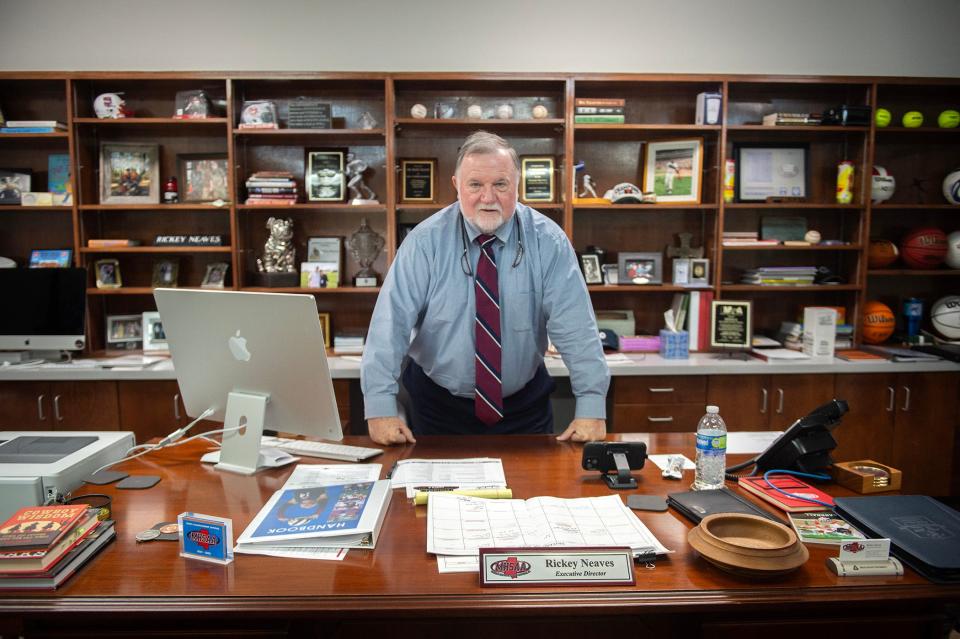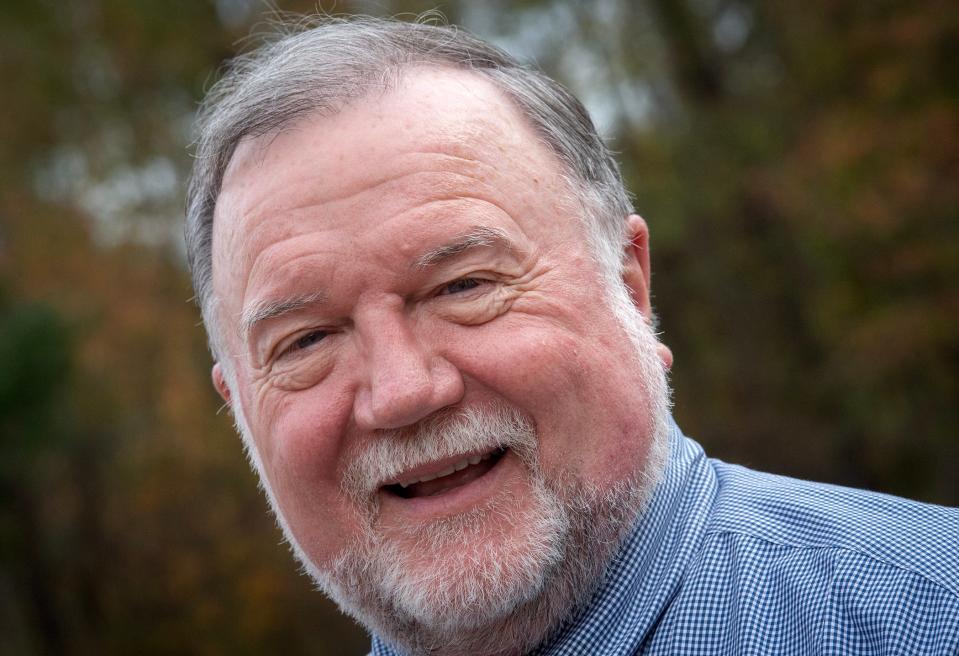MHSAA executive director Rickey Neaves discusses everything from NIL to addition of 7A
January of 2024 would mark Mississippi High School Activities Association executive director Rickey Neaves' third year in charge. In the two years Neaves has been in charge he has prioritized player safety, moved MHSAA to Class 7A and has handled 245 public high schools in athletics and academics to their most total capability.
In a question and answer interview with Neaves, The Clarion-Ledger's Michael Chavez sat down and discussed a handful of topics ranging from player safety, addition of Class 7A, NIL in high school and more.
Chavez: What are your thoughts with NIL in Mississippi high schools and your stance on it?
Neaves: While we do not want to keep students from profiting from their name, image or likeness, we do have amateur rules where they cannot receive X number of dollars more than X number of dollars or goods for their play. But if they are willing to work or something like that we would not stand in the way of that as long as they don't use the their school or our logos or uniforms or they're not given something because they are the quarterback at a high school would be OK.
Chavez: What do you see as the new sport(s) to come to MHSAA, if there is one?
Neaves: We're always getting inquiries about new sports. Lacrosse seems to be growing across the nation and we've had inquiries about that. Wrestling we now sanctioned although we don't have championships but it seems to be growing when it reaches a certain point. ... We get inquiries at times about things as simple as cornhole, starting at the high school level. So we try to keep our thumb on the pulse of the nation, but basically of the state, and when it's out there and we have enough schools interested in it, we try to implement it in our state.
Chavez: Would there be problems with new sports coming in?
Neaves: One of the problems with starting new sports is we have such a variety of schools and from 1A-7A, and what could possibly be good for our larger classifications might not be good for our small classifications. The smaller the classification, the more they have to share athletes between sports, and it might take away someone from other sports to start a sport, and therefore, they may have to drop a sport, so we have to be careful with that mix.

More: Mississippi Super 25 high school football rankings Week 15: Playoff semifinals
Chavez: Do you believe that the MHSAA is strict enough when it comes to heat index policy?
Neaves: I think we have done a great job through our sports medicine committee that we have in our state along with the National Sports Medicine committee trying to make all of our sports as safe as possible as our number one prerogative. We started this year working through the Corey Springer Institute, which is the go-to place for everyone in the nation for player safety and, about to heat, we adopted their policies, and we're even having them down at our office next month for a summit to review all of our policies.
Chavez: How much longer do you see yourself in this role?
Neaves: I took this role two years ago; I told them three to five years. So, I'll still stick with that. I plan on being in this role for at least two more years, if not longer depending on help, then a lot of other things.
More: Brandon football overwhelms Pearl in MHSAA 7A quarterfinal, sets up rematch with Oak Grove
Chavez: Are there any personal accomplishments you feel you've achieved when you've been here?
Neaves: I think going to 7A has been good for the state for all sports. And we've done that since I've took over as executive director. Of course I was here 10 years prior to that as associate director. We've updated our telecommunication scene and our streaming process. We've gotten more games on TV. We've made the safety of our athletes better. And I think our communications system now between this office and our schools has gotten better.
Chavez: Do you have any specific goals you want to accomplish that you haven't yet?
Neaves: Yes, I would like to see sportsmanship grow throughout the state. Two years ago, we had a statewide sportsmanship program that seemed to do well, and we didn't emphasize it as much or hadn't emphasized it as much this year. We have to get back to players, parents, coaches and officials, respecting the game and respecting each other and show good sportsmanship at all of our events.
Chavez: Why did you know want to make that jump to Class 7A?
Neaves: We were getting a lot of concern when we were just 6A. ... That number to where 7A-6A there's only about 400 students difference. It's trickled down to the fact where it's even helped our small schools. If you look at 1-2A there there may just be 30 or 40 students different from the largest to the smallest. This makes for not only safer games, but it also makes the competition better. ... It has given more student athletes the opportunity to experience playoffs and state championships while making all of our classifications more competitive.

Chavez: Do you have any mentors or any people that you talk with to discuss big decisions?
Neaves: Don Hinton was the executive director here who hired me as associate director and I looked to him for guidance. I was on the board when Dr. Ennis Proctor was here. I look to other executive directors in other states. We have a network that are 51 associations nationwide. I communicate mostly with Section 3, which is Mississippi, Alabama, Tennessee, North (and) South Carolina, Georgia, Florida and Louisiana. And I communicate mostly with them simply because they face more of the same problems that we face by being in the Southeast region of the United States.
Chavez: Could you expand on the issues the southeast region similarly faces?
Neaves: We face things such as the transfer rules and the heat index. We face the heat index through the schools in the states and the northern part. They don't play their baseball in June and July because there's snow on the field, so we don't get a lot of help from them, and we can't offer them a lot of help. There are things such as transfers and the heat index, just the way the southern culture is and what we allow and what we don't allow.
Chavez: Where do you feel like the MHSAA is right now regarding how you want it?
Neaves: We're in real good shape right now. Some of the issues that we will be facing in the future are how we deal with students who are homeschooled. If the legislature passes school choice, how will we deal with that, and how will that affect our eligibility and transfer rules. We work closely with the legislature on some of that, too, so we're on solid ground.
Michael Chavez covers high school sports, among others, for the Clarion-Ledger. Email him at mchavez@gannett.com or reach out to him on X, formerly Twitter @MikeSChavez.
This article originally appeared on Mississippi Clarion Ledger: MHSAA executive director Rickey Neaves discusses NIL, 7A and more

